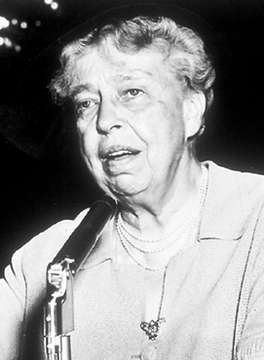 |
| Eleanor Roosevelt speaking at a United Nations. (Student Resource Center - Gold (The Library of Congress)) |
“Like royalty she hurried through the daily tour, the endless inspecting, of hospitals, jails, insane asylums, nursery schools, kindergartens, training camps, housing developments. The laying of cornerstones, the commemoration of events…. People fainted in hospital corridors trying to keep up with her. Her code name was Rover.” (John Dos Passos) Behind every great man lies a great woman. Eleanor Roosevelt illustrates an accurate example of progressive women. Eleanor Roosevelt, a humanitarian and philanthropist, inspired others to work tirelessly and selflessly. Because Eleanor Roosevelt overcame many obstacles, broke the status quo of a traditional idle First Lady, and became an inspiration to all, Eleanor Roosevelt will always be considered a hero.
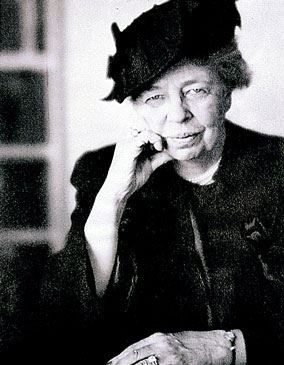 |
| (http://afteramerica.files.wordpress.com/2010/01/eleanor-roosevelt-opt.jpg) |
Eleanor Roosevelt, who was born on October 11, 1884, grew up in an unusual home. “The oldest of three children, she was caught between a loving and charming but irresponsible father and a cold, disapproving, highly neurotic mother” ("Roosevelt, Eleanor (1884-1962)." DISCovering Biography). Eleanor also possessed a “strong inferiority complex” and later “recalled herself as ‘a solemn child, without beauty. I seemed like a little old women entirely lacking in the spontaneous joy and mirth of youth’” ("Roosevelt, Eleanor (1884-1962)." DISCovering Biography). After her mother died, while her father checked himself into a drunk’s rehab, Eleanor and her brothers were sent to their grandmother, Mary Ludlow (Mrs. Valentine) Hall. At age 15, Eleanor’s grandmother sent Eleanor to Mademoiselle Souvestre’s finishing school at South Fields, England. During her time at finishing school, Eleanor discovered her father’s death. After Eleanor completed finishing school, she met Franklin Delano Roosevelt through their uncle Theodore Roosevelt and they married soon after. After Franklin was diagnosed with polio, Eleanor nursed him back to health. Franklin signed up for election and became President of the United States. Eleanor stood by his side throughout his work, and became his “eyes” and “ears.” She traveled to many places and spoke on countless radio shows. On November 6th 1962, Eleanor passed away in her hometown, New York, New York.
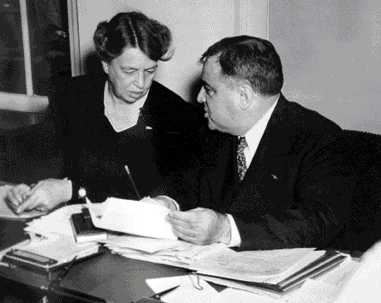 |
| Eleanor Roosevelt speaking to Fiorello LaGaurdia (Student Resource Center - Gold) |
In a time of oppression, where most women were not heard by men in society, Eleanor Roosevelt rose above other female activists and achieved a position of power to act on her beliefs. Eleanor inspired everyone with her words. She once said, “I have never believed that war settled anything satisfactorily, but I am not entirely sure that sometimes there are certain situations in the world such as we have in actuality when a country is worse off when it does not go to war for its principles than if it went to war.” This illustrates her pacifist and peace lover personality. However, Eleanor is contradictory when she says that in some situations it is better for a country to go to war for its principles, this also shows that she is willing to fight for her ideals. One instance when Eleanor is placed in a position of authority, “Holding no official position, she felt she could speak more freely on issues than could Roosevelt, and she also became a key contact within the administration for officials seeking the President's support.” ("Eleanor Roosevelt." Encyclopedia of World Biography). While in a place to speak her mind freely, Eleanor spoke her morals and acted on them.
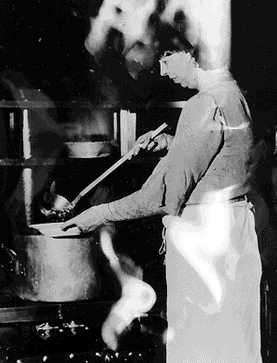 |
| Eleanor Roosevelt ladling soup at a soup kitchen. (Student Resource Center - Gold) |
Eleanor Roosevelt exceeded the expectations as the “tradition that the First Lady was primarily the social leader of Washington, remaining in the White House to receive foreign diplomats, members of Congress, and top administrators and their spouses.” ("Roosevelt, Eleanor (1884-1962)." DISCovering Biography) Eleanor didn’t follow the set “code” for First Ladies and blazed a new trail of her own. According to Admiral William F. Halsey, when “she inspected those hospitals, I don't mean that she shook hands with the chief medical officer, glanced into a sun parlor, and left. I mean that she went into every ward, stopped at every bed, and spoke to every patient. . . . I marveled at her hardihood, both physical and mental. She walked for miles, and she saw patients who were grievously and gruesomely wounded. But I marveled most at their expressions as she leaned over them. It was a sight I will never forget’” ("Roosevelt, Eleanor (1884-1962)." DISCovering Biography). This shows her dedication and determination to her cause. Also, she would act as many other First Ladies did not. Eleanor sacrificed her time and money, to ensure that her effort was methodically reviewed.
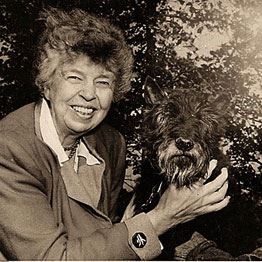 |
| (http://www.positivityblog.com/_images/Eleanor_Roosevelt.jpg) |
After suffering much hardship and criticism, Eleanor Roosevelt endured and conquered her fears and obstacles. “In September 1918, as Franklin returned from an inspection trip to Europe stricken with double pneumonia, Eleanor discovered love letters written by Lucy Page Mercer, her own personal secretary and a person she considered a friend. Considering herself a failure as a woman, she offered to divorce Franklin. For a variety of reasons — concern for the children, pressure from Sara, Lucy's feelings of guilt as a Roman Catholic over marrying a divorced man, Franklin's obvious political ambitions — the marriage formally remained intact, but any intimacy had vanished” ("Roosevelt, Eleanor (1884-1962)." DISCovering Biography). Franklin’s infidelity crushed Eleanor, but she prevailed above her adversity. Rising above this barrier, Eleanor grew to be self-supporting and self-thinking. She pulled away from her mother-in-law and embraced her individuality.
Another example that proves Eleanor’s strength is “During the last decade of her life Eleanor Roosevelt traveled to numerous foreign countries, including two trips to the Soviet Union, and authored several books. She continued to articulate a personal and social outlook which, while never profound and sometimes banal and obtuse, still inspired millions. But by the early 1960s, although she had accepted three new government appointments from President John F. Kennedy (delegate to the U.N., adviser to the Peace Corps, and chairman of the President's Commission on the Status of Women), her strength was waning” (Alexander, Charles). Eleanor is strong-willed, unwavering, and committed. She devoted her life to many causes and contributed to her nation greatly. Eleanor Roosevelt, a compassionate and charity donor, rose above hurdles, surpassed the standard, and moved a numerous amount of people. Considered a hero, Eleanor motivated others to work hard and believe in themselves. All in all, Eleanor Roosevelt remains a hero among heroes.
Page created on 5/20/2010 12:00:00 AM
Last edited 5/20/2010 12:00:00 AM
Alexander, Charles. "Roosevelt, Eleanor (1884-1962)." [Online] Available http://find.galegroup.com/srcx/infomark.do?&contentSet=GBRC&type=retrieve&tabID=T001&prodId=SRC-1&do. 1998.
author, no. "Roosevelt, Eleanor (1884-1962)." [Online] Available http://find.galegroup.com/srcx/infomark.do?&contentSet=GSRC&type=retrieve&tabID=T001&prodId=SRC-1&do. 2004.
author, no. "Eleanor Roosevelt." [Online] Available Gale Virtual Reference Library. 2004.
